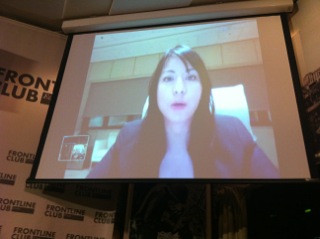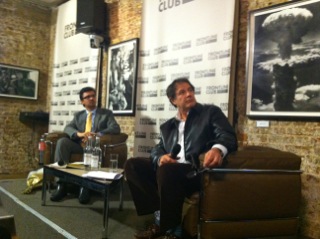By Ivana Davidovic

"With our souls, with our blood, we would sacrifice anything for you Bahrain" people chanted on the streets of Bahrain. In February 2011, while the media glare was firmly focused on the uprising in Egypt, the Bahraini people were left to shout in the dark.
One of their rare witnesses was Al Jazeera's May Ying Welsh, who went undercover, without the permission of the Bahraini government, to record the people's desperate and unanswered calls for democracy which started in February last year.
Bahrain: Shouting in the Dark, as its tagline states, tells “the story of the Arab revolution that was abandoned by the Arabs, forsaken by the West and forgotten by the world.” It went on to win one of the most prestigious recognitions in journalism -2011 Foreign Press Association's Documentary of the Year Award.
On his Twitter account Bahraini Foreign Minster Khalid Al Khalifa criticised Qatar, where Al Jazeera are based:
“It's clear that in Qatar there are those who don't want anything good for Bahrain. And this film on Al Jazeera English is the best example of this inexplicable hostility.”
The reaction of the regime is hardly surprising as Welsh has exposed all of the brutality which was, at least at the time, hidden from the eyes of the world.
We see unarmed people shot, beaten, teargassed. We see doctors and nurses, Sunni and Shia, in the Al Salmaniya hospital reduced to tears after treating injured protesters for 48 hours without a break, unable to comprehend what is happening to their country.
We see how the regime's brutal crackdown against its own people gathers force with the introduction of martial law and media “witch hunts” - all with the help of the military forces from the Gulf states.
We see how the protesters are desperate for their revolution not be portrayed as some sort of sectarian violence between Shias and Sunnis, but as a unified call of all Bahrainis for the end of the authoritarian regime and the introduction of constitutional monarchy.
The film's executive producer, Jon Blair, who moderated the Q&A, asked Welsh, who talked via Skype, to explain how did she found those months living and working in Bahrain.
“Because of the undercover aspect of the filming, I needed to leave the hotel system. I moved into an apartment where the details of my passport were not reported to the interior ministry.”
“I started being monitored by the government through the sim card in my phone so I had to take it out. I did have the police coming to my apartment, a large group of them. There were check points everywhere. I had to wear an abaya and hijab and put my camera in my feminine purse so I wouldn't look like a foreigner or a journalist.”
When asked why the Western world decided to stand back, when they got involved in Libya for example, Walsh said:
“I think the reason is not being able to afford to upset Saudi Arabia, it's not so much to do with the US Fifth Fleet presence. That is my opinion at least. If Bahrain were to have a real democracy, that would impact the eastern part of Saudi Arabia where all the oil is and we depend on that oil. Shias living in Bahrain are the same people, the same tribe, who live in that part of eastern Saudi Arabia, they would probably also rise up then and demand change.”
Present at the Q&A session was also an ex-Bahraini MP Ali Mahdi Alaswad who resigned in February 2011, along with 17 other Al Wefaq MP's, in response to the brutal crackdown against pro-democracy demonstrations.
He said that the situation in his country has hardly improved since then.

“The clashes are still continuing. If there are casualties, they still can't go to the Al Salmaniya hospital. The situation is still the same."
“Most of the people who were interviewed in the film are still detained or are out awaiting trial, they cannot travel anywhere.
“The opposition politicians were talking to the Crown Prince, unfortunately he has no power now. People in Bahrain are still demanding. Their demands for reform are still increasing. But the authorities don't want to upset the Saudis, as about 75 per cent of their income depends on them. The situation is very difficult. But the people are still demanding democracy and they won't stop until it is achieved.”
With the anniversary of the first Pearl Roundabout protest coming up on February 14, one audience member who lived in Bahrain was worried that there might be another carnage on the horizon. Alaswad hinted that the people are certainly not going to let that day slip quietly.
“People in Bahrain are getting angry now. They don't want to see politics, they just want to be outside, protesting, they want to express their feelings. Everybody in Bahrain is waiting for February 14. The regime in Bahrain are thinking what to do. We are planning many activities, but I can't say more now”
You can watch the Shouting in the Dark Q&A here. Click here to watch Shouting in the Dark.